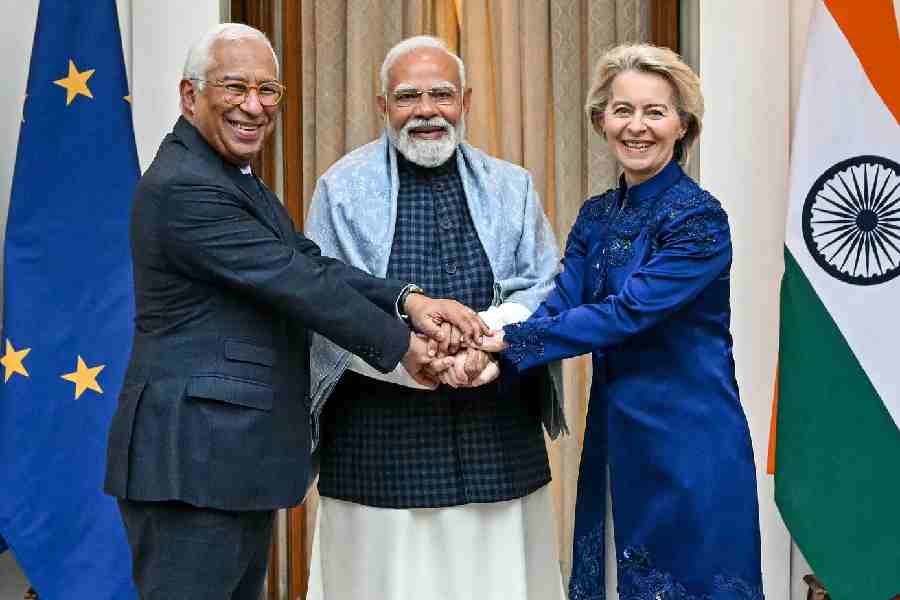Gone for a toss
Sir — Digital India is inimical to friendships. This may seem like a strange statement to make but the link between digitisation and friendship is not difficult to establish. Digitisation has led to coins becoming precious commodities — loose change has all but disappeared from the public sphere. With this, para cricket matches have become fraught affairs. In the absence of a coin to toss, friends cannot decide who gets to bat first and this is leading to broken friendships. In the interests of communal peace, it is necessary to suitably increase coin production and implement measures to prevent hoarding of coins.
Pritam Ganguly,
Calcutta
Unsafe city
Sir — The tragic fire at the Rituraj Hotel in Calcutta underscores a recurring pattern of apathy towards fire safety (“CM: Ensure fire safety or else...”, May 2). Fourteen lives, including those of young children, were lost in what is clearly a case of gross negligence. Despite repeated fire tragedies in the past, many establishments continue to flout safety regulations with impunity. The authorities must not allow such blatant disregard for life to go unpunished. Fire safety compliance must be enforced with urgency and rigour across all hospitality establishments.
Aayman Anwar Ali,
Calcutta
Sir — That a guest died after falling from a cornice highlights the horrific absence of safe escape routes in the Rituraj Hotel fire. Hotels are meant to offer shelter, not serve as death traps. This catastrophe reflects poorly not only on the hotel management but also on regulatory bodies tasked with ensuring safety compliance. Regular, unannounced inspections are essential, and strict penalties should be levied on violators. Lives must not be sacrificed at the altar of negligence and profit.
Prasun Kumar Dutta,
West Midnapore
Sir — Despite the painful lessons from the AMRI and Stephen Court fires, Calcutta is yet to internalise the importance of fire safety. The Rituraj Hotel blaze is a grim reminder that these tragedies continue due to repeated lapses in enforcement and oversight. Commercial buildings with inadequate ventilation, no fire exits and blocked staircases should be shut down immediately. Mere post-disaster probes will not suffice — what is needed is proactive governance and zero tolerance for non-compliance.
Dattaprasad Shirodkar,
Mumbai
Sir — The police initiative to inspect fire safety compliance in hotels, restaurants, and pubs is welcome, albeit long overdue. The Rituraj Hotel tragedy could have been averted had such checks been routine rather than reactive. That many buildings still use sealed windows and flammable materials is shocking. While the involvement of police is commendable, fire department expertise should not be excluded
from these audits. Coordinated, rigorous inspections — followed by strict enforcement — are crucial if similar disasters are to be prevented. Public safety must take precedence over commercial convenience.
Ifthekhar Ahmed,
Calcutta
Sir — The mayor’s decision to close rooftop restaurants is a long-overdue step in restoring the integrity of common spaces in residential and commercial buildings. Rooftops are vital for emergency evacuations and must not be obstructed by profit-driven ventures. The Rituraj Hotel tragedy has shown how a lack of clear escape routes can turn fatal. The use of rooftops as exclusive commercial zones violates both safety norms and civic logic. Regular audits and strict penalties for violators are essential if the city is serious about preventing more such disasters.
Gautam Paladhi,
Calcutta
Sir — The fact that the chief minister, Mamata Banerjee, found 24 gas cylinders stored dangerously during a routine inspection speaks volumes. These are not isolated lapses but symptoms of systemic neglect. The crackdown on rooftop restaurants and unlicensed businesses must not be cosmetic. Only coordinated efforts among the fire department, police, and municipality — backed by political will — can rectify decades of carelessness. The city must stop waiting for tragedies to enforce the law.
Tusar Kanti Kar,
Howrah
Imbalance sheet
Sir — The ministry of statistics and program implementation’s capex survey offers a promising start but highlights critical gaps. The reluctance of many firms to share complete data, even under statutory mandate, points to trust and security issues. As a result, the survey findings remain indicative rather than definitive. Improved safeguards and transparent communication are essential to ensure full participation in future iterations, allowing policymakers to rely on this data for planning.
Ronodeep Das,
Calcutta
Sir — The stark contrast between private and government capital expenditure growth is concerning. Incentives alone may not suffice. Structural reforms, ease of doing business, and credit facilitation can encourage private investment.
D. Bhattacharyya,
Calcutta










